The Checker Maven
The World's Most Widely Read Checkers and Draughts Publication
Bob Newell, Editor-in-Chief
Published every Saturday morning in Honolulu, Hawai`i
Noticing missing images? An explanation is here.
The Other Benjamin

Who among us has not read The Autobiography of Benjamin Franklin, and derived untold benefit from the eminently practical wisdom and philosophy of its author? And who would be surprised to learn that Ben Franklin was himself a checker player, who praised the merits of the game as training for life?
Today's Checker School problem, though, was composed by a different Benjamin: E. A. Benjamin, to be precise, but we think it's as practical and useful, at least in checker terms, as Ben Franklin's advice for living a successful life. The problem situation is shown below.
White
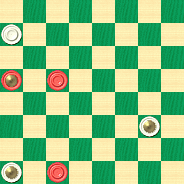
Black
Black to Play and Win
B:W28,K9,K4:BK20,19,3.
Taking a closer look, we see that White has a material advantage, having two kings to Black's one, but Black's mobility is clearly superior. Is it enough to turn the situation into a Black win? Try it out, and then click on Read More for the solution, notes, a sample game, and some words of wisdom from the better-known Benjamin.![]()
A Summer of Checkers
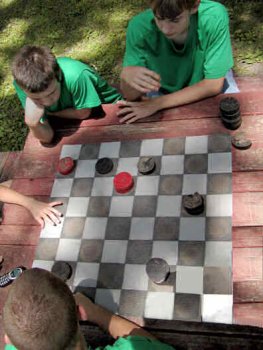
In the Northern Hemisphere, it's now officially summer; and what is better in summer than, at a picnic or outdoor gathering, to play a few games of checkers? A cool drink, a slice of watermelon, and a friendly contest or two over the board ... that's life at its best. At least, it usually is....
In today's column, we join Billy (we've already met him in one of our earlier stories), who is off for a month at summer camp. As one of the top players on his school team, Billy has become a sort of informal checker instructor. It's mid-afternoon, and the boys, having just finished a somewhat rowdy game of leap frog in a nearby field, have gathered at a picnic table and are settling down to some checker work.
"Here," said Billy, "let me show you guys one that's kinda like playin' some more leap-frog." He then set up the position below.
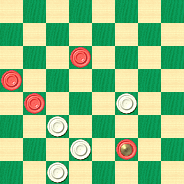
WHITE
White to Play and Win
W:W19,22,26,30:B10,13,17,K27.
"Can ya believe it," Billy continued, "White can win this here one!"
The rest of the boys were talking among themselves, expressing more than a little skepticism. "But it don't look so good," objected Willy, one of the younger and less experienced players. "I mean, Black's got a king and stuff!"
Just then Mort arrived with a big plate of watermelon and a tray of sodas. He had been last at leap-frog and so was made to "go fetch" for the other boys. "Well," Mort exclaimed, glancing at the checkerboard as he set down the refreshments, "I ain't so good at leap-frog but I can win that game there!"
The words "yeah, right" were heard repeatedly as the gang attacked the food and drinks. "I can too!" Mort said in a loud and exasperated voice. "I'll show ya!"
Billy sat back a little, put down his soda, and said to the other boys in a firm tone, "Hey guys, give 'em a shot at it." This was accompanied with a bit of a wry grin that Mort didn't catch. "Tell ya what. If he figgers it out, somebody else gets the next tray of sodas. If he don't get it, maybe he needs a bath or somethin'."
Everyone started to laugh except Mort, who realized now that if he didn't find the solution, he was probably going to get summarily tossed into the lake. But there was no turning back. Shaking just a little and hoping the boys wouldn't notice, he sat down at the board.
Don't be all wet yourself. Solve the problem and click on Read More to check your solution.![]()
A Real Eye-Popper

We found this problem in a old and rather eclectic checker book. The author, who must have been an eclectic character in his own right, referred to the solution as "a real eye-popper."
You may or may not agree--- after all, what constitutes an eye-popper is in the mind of the beholder--- but we do think you'll enjoy solving this one.
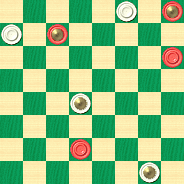
BLACK
Black to Play and Draw
B:W30,28,K15,K1:BK29,K27,21,7.
Forces are even, but Black has a weak man that White can pick off in just a few moves. Can you focus on this one and see your way to a Black draw?
Don't be blinded by the seeming difficulty; clicking on Read More will provide 20-20 hindsight by bringing you the snappy, perhaps even eye-popping, solution.![]()
Ein Feste Burg (A Mighty Fortress)

No, we're not talking about the well-known Lutheran hymn, based on the beautiful aria from J. S. Bach's cantata, BWV 80, "Komm in mein Herzenshaus," although that too would make a wonderful topic if this were other than a checker column.
Instead, we're talking about a "checker fortress" as featured a little while back in Brian Hinkle's challenging Bear Claw problem (click here to review). This problem genre was once treated by Ben Boland (are we surprised?) in one of his many books.
Today, armed with the knowledge gained from Brian's problem, see if you can break into the fortress by solving these three problems. Perhaps you might wish to play some of Bach's immortal music in the background, for the purpose of relaxation, as solving these will be anything but easy.
BLACK
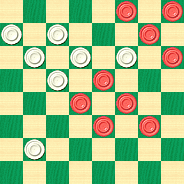
WHITE
White to Play and Draw
W:W5,6,9,10,11,14,25:B3,4,8,12,15,18,19,23,24.
BLACK
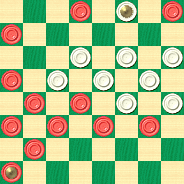
WHITE
White to Play and Draw
W:WK3,10,11,12,14,15,16,19,20:B2,4,5,13,17,18,21,22,23,24,25,K29.
BLACK
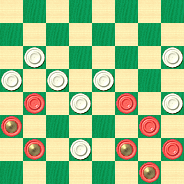
WHITE
White to Play and Draw
W:W9,12,13,14,15,18,20,26:B17,19,K21,24,K25,K27,28,K32.
When you've crashed through the ramparts, click on Read More for solutions, notes, more examples and illustrations, as well as some history on this type of problem.![]()
All Ahead Full

A very nice speed problem awaits us this month; it's a situation that looks contrived, but arose in actual play. Good visualization and a firm grasp of tactics will lead you to the solution. It's really easy enough ... but can you get it in thirty seconds? Click below to show the position and to start our no-turning-back Javascript clock. Full speed ahead!
Did you get it? Click on Read More to reveal the very pleasing solution.![]()
Reid's Rocker
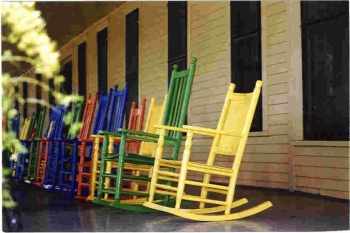
This week we return again to Willie Ryan's Tricks Traps & Shots of the Checkerboard, a checker classic if there ever was one, and arguably one of the Bronx Comet's best works. Here's one that Willie calls "basic" from the Laird and Lady. We're not sure just how basic it really is, but let's let Mr. Ryan tell us all about it.
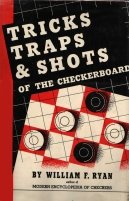
"The ancient and intricate Laird and Lady opening is chock-full of mid-game pitfalls, some of which defy detection by the sharpest eye. Featured here is one of the basic snares encountered on this opening, which has claimed numberless victims of varying skill. The trap is generally credited to William Reid, but it was probably known to Andrew Anderson, who was first to probe the opening extensively.
| 11-15 | 23-19 |
| 8-11 | 22-17 |
| 9-13 | 17-14 |
| 10-17 | 21-14---A |
| 15-18 | 19-15 |
| 4-8 | 24-19 |
| 6-10---B | 15-6 |
| 1-17 | 25-22 |
| 18-25 | 30-14 |
| 2-6 | 29-25 |
| 13-17---C | 25-21 |
| 11-16---D. |
See the diagram.
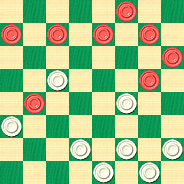
WHITE
White to Play and Win
W:W14,19,21,26,27,28,31,32:B3,5,6,7,8,12,16,17.
A---Forms the Laird and Lady opening, so named by Andrew Anderson, of Edinburgh, Scotland, first Champion of the World, who did much to develop and popularize this complicated debut.
B---Considered the easiest line for black to handle. Of course, 11-16 would be suicide since with 26-22, 16-23, 15-10, 6-15, 25-21, 18-25, 27-4, white would win.
C---Certainly a very natural move, but it's a dead duck. The correct moves are: 11-16, 26-23, 6-10, 28-24* (25-21, 10-17, 21-14, 7-10 wins for black), 10-17, 24-20; at this position, 8-11, 19-15 results in a draw, but 7-11 loses to white, who proceeds to win with 25-21, 17-22, 19-15, 11-18, 20-4.
D---Into the whirlpool, but black's predicament is hopeless. Black cannot take the shot via 5-9, 14-5, 11-16, 21-14, 16-30, as now the boomerang by 14-10, 6-15, 31-26 ends all. Again at D, if black tries 6-10, white nails the win with 27-23, 11-16---E, 28-24, 16-20, 32-28, 20-27, 31-24, 8-11, 24-20, 11-15, 19-16, 12-19, 23-16, 15-18, 16-11, 7-16, 14-7, 3-10, 21-7, and black is through.
E---Or 11-15, 28-24, 8-11, 32-28, 3-8, 24-20, 15-24, 28-19, 11-15, 19-16, and black is doomed."
We'd certainly call this a harder than average problem, but don't let it rock your socks. Clicking on Read More will ease your ride by bringing you Willie's solution.![]()
Rustic Charm

We always appreciate the beauty of simplicity, such as the rustic charm of a country inn, where basic, down-to-earth dishes are served up with a special kind of elegance. We think you'll agree that today's little problem shares that simple charm; it's a practical situation requiring straightforward yet precise play.
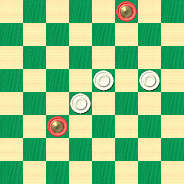
WHITE
White to Play and Win
W:W18,16,15:BK22,K3.
White is a man up, but Black has two kings and seems to be in control. Can you find the way for White to come through with a win? We're not talking about the type of play that resembles haute cuisine, just honest country cooking leading to a satisfying repast.
The problem is quite a bit easier than it might appear at first glance. Work out the solution (without a board and pieces, if possible), but be sure to avoid the inelegance of frustration; clicking on Read More will give you an annotated run-down of the winning procedure.![]()
Playing Like A Robot

We're sure you know one or even more checker players that play checkers like a robot. They might mechanically play their "book" moves, with no understanding of the ideas supporting the moves; or they might get a notion in their head and stick to it like an automaton, no matter what the situation on the board might call for.
In today's column, we'll consider the latter situation; a player who, in a classic "Dyke" formation decides to run off the attacking piece and can't be dissuaded from that pre-programmed course of action. Let's look at the game.
BLACK: Skilled Player
WHITE: Robot-Like Player
| 1. | 11-15 | 22-17 |
| 2. | 15-19 | 23x16 |
| 3. | 12x19 | 24x15 |
| 4. | 10x19 |
We now have a classic Dyke position:
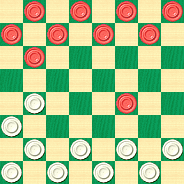
WHITE
Diagram 1: White to Play
W:W32,31,30,29,28,27,26,25,21,17:B19,9,8,7,6,5,4,3,2,1.
| 4. | ... | 27-23 |
White wants to run off the attacking piece. This move doesn't lose but it isn't the best. Question 1: What's a better move at Diagram 1 for White?
| 5. | 8-12 | 23x16 |
| 6. | 12x19 |
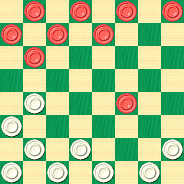
WHITE
Diagram 2: White to Play
W:W32,31,30,29,28,26,25,21,17:B19,9,7,6,5,4,3,2,1.
Guess what White does next...
| 6. | ... | 32-27 |
Preparing once more to go after the "Dyke" piece. As before the move doesn't lose but isn't best. Question 2: What's a better move at Diagram 2 for White?
| 7. | 4-8 |
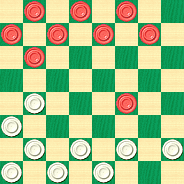
WHITE
Diagram 3: White to Play
W:W31,30,29,28,27,26,25,21,17:B19,9,8,7,6,5,3,2,1.
| 7. | ... | 27-24 |
White carries out his plan and makes a weak move. Had he played 27-23 instead, he would have lost quickly by 19-24 28-19 9-14 17-10 6-24, and White can't hold out against Black's freely roaming king.
But White could have held the game with a different move altogether. Question 3: What should White have played at Diagram 3?
| 8. | 7-10 | 24x15 |
| 9. | 10x19 |

WHITE
Diagram 4: White to Play
W:W31,30,29,28,27,26,25,21,17:B19,9,8,7,6,5,3,2,1.
| 9. | ... | 31-27 |
The robot continues unthinkingly on its course, and seals its own doom. Question 4: How could White have held out longer at Diagram 4?
| 10. | 19-23! | 27x18 |
If instead 26-19 then 9-14 17-10 6-31 wins for Black.
| 11. | 9-14 | 18x9 |
| 12. | 6x31 |
Black wins. The robot-like player of the White pieces has a real lesson to learn from this game! You, too, might learn something: click on Read More for all the answers.
Footnote: We'll be closing the Checker Maven offices for a few weeks as we ourselves encounter a much different type of robot. Thanks to computerization, our Saturday morning articles will continue to appear on schedule each week. However, we may not be able to respond to your emails for a period of time. We do expect to return to business as usual at some point in June, 2007.![]()

Once More Around the Block

To add still more variety to our "first Saturday of the month" columns, in addition to speed problems and stroke problems, we'd like to offer an occasional "block" problem. Now, we've likely already given away a bit too much, but today's offering does require a bit of visualization skill, so just this once we'll forgo our unforgiving Javascript clock, and allow you as much time as you need.
Here's the position:
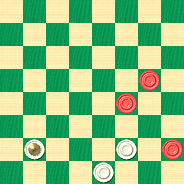
WHITE
White to Play and Win
W:W31,27,K25:B28,19,16.
Try to work it out without moving pieces on a board, but if you can't get around a mental block, just click on Read More to see how it's done.![]()
Checker School: Cowie's Position

While the photo above certainly depicts an interesting position (although one which we're most unlikely to attempt ourselves), our title, and today's lesson in our ongoing Checker School series, refers to a position of a much different nature.
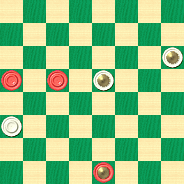
WHITE
White to Play and Win
W:WK12,K15,21:B13,14,K31.
It's three against three, but White has two kings and seemingly the upper hand. But the twists and contortions necessary to score the win will require much flexibility of thought. See if you can master this surprisingly intricate position; but don't get tied up in knots; clicking on Read More will definitely ease the strain by bringing you the full solution, a sample game, and Ben Boland's detailed notes and commentary.![]()
The Checker Maven is produced at editorial offices in Honolulu, Hawai`i, as a completely non-commercial public service from which no income is obtained or sought. Original material is Copyright © 2004-2026 Avi Gobbler Publishing. Other material is public domain, AI generated, as attributed, or licensed under CC1, CC2, CC3 or CC4. Information presented on this site is offered as-is, at no cost, and bears no express or implied warranty as to accuracy or usability. You agree that you use such information entirely at your own risk. No liabilities of any kind under any legal theory whatsoever are accepted. The Checker Maven is dedicated to the memory of Mr. Bob Newell, Sr.

